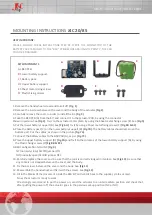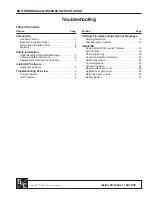
CHAPTER
THREE
FOR MICROPYTHON USER
This section contains the history of MicroPython, installing MicroPython in Pico, the basic syntax of MicroPython
and a dozen interesting and practical projects to help you learn MicroPython quickly.
We recommend that you read the chapters in order.
3.1 Geting Started with MicroPython
MicroPython is a full Python compiler and runtime that runs on the microcontroller’s hardware like Raspberry Pi Pico.
The user is presented with an interactive prompt (the REPL) to excute supported commands immediately. Included are
a selection of core Python libraries; MicroPython includes modules which give the programmer access to low-level
hardware.
• Reference:
3.1.1 The Story Starts Here
Everything changed in 2013 when Damien George launched a crowdfunding campaign (Kickstarter).
Damien was an undergraduate student at Cambridge University and an avid robotics programmer. He wanted to reduce
the world of Python from a gigabyte machine to a kilobyte. His Kickstarter campaign was to support his development
while he turned his proof of concept into a finished implementation.
MicroPython is supported by a diverse Pythonista community that has a keen interest in seeing the project succeed.
In addition to testing and supporting the code base, the developers provided tutorials, code libraries, and hardware
ports, making the project far more than Damien could have done alone.
• Reference:
3.1.2 Why MicroPython
Although the original Kickstarter campaign released MicroPython as a development board “pyboard” with STM32F4,
MicroPython supports many ARM-based product architectures. The mainline supported ports are ARM Cortex-M
(many STM32 boards, TI CC3200/WiPy, Teensy boards, Nordic nRF series, SAMD21 and SAMD51), ESP8266,
ESP32, 16bit PIC, Unix, Windows, Zephyr and JavaScript. Second, MicroPython allows for fast feedback. This is
because you can use REPL to enter commands interactively and get responses. You can even tweak code and run it
immediately instead of traversing the code-compile-upload-execute cycle.
While Python has the same advantages, for some Microcontroller boards like the Raspberry Pi Pico, they are small,
simple and have little memory to run the Python language at all. That’s why MicroPython has evolved, keeping the
main Python features and adding a bunch of new ones to work with these Microcontroller boards.
39
Summary of Contents for Thales Kit
Page 1: ...SunFounder Thales Kit for Raspberry Pi Pico Release 1 0 Jimmy SunFounder Jun 04 2021 ...
Page 2: ......
Page 4: ...ii ...
Page 6: ...SunFounder Thales Kit for Raspberry Pi Pico Release 1 0 2 CONTENTS ...
Page 140: ...SunFounder Thales Kit for Raspberry Pi Pico Release 1 0 136 Chapter 3 For MicroPython User ...
Page 164: ...SunFounder Thales Kit for Raspberry Pi Pico Release 1 0 160 Chapter 4 For Arduino User ...
















































